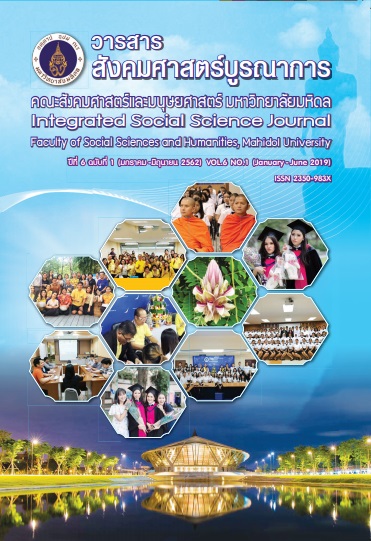Decentralization and Innovation of Educational Management Relating to Thai Local Government
Main Article Content
บทคัดย่อ
In the 85 years since the revolution that transformed the country into a democracy, progress in educational ecentralization has been made but it has been rather slow due to the central authorities’ fear that local agencies do not have the capability to realize the changeover. This situation, however, is gradually changing. Some local authorities have lately shown their talents in strengthening their capacity to educate their people. The objectives of this research were: (1) to study the evolution of Thai decentralization in educational administration policy from the central government to local governments; (2) to study how the local government shows their capacity to manage the education as they are given the opportunity to do so, and, finally; (3) To identity innovation in education administration that local governments have shown so far. This can be considered proof that, if given the opportunity. Local governments can successfully implement central government-initiated educational decentralization policy. The research methodology includes document reviews, interviews with well-known scholars of government education, authorities and administrators. Lastly, it uses a questionnaire for local administrators and school headmasters throughout the country.
This study found that,
First, the evolution of Thai educational decentralization. There are three different phrases in the decentralization of education from central government to local government. First, after the regime change to the Kingdom of Thailand from 1932 until 1997. This time was the beginnings of Thai democracy. It has been very slow because of problems with unity and national security. Second, during the constitution of the Kingdom of Thailand from 1997 to 2007. This second time saw the blooming of Thai democracy under pressure from the Constitution of the Kingdom of Thailand. Third was under the Constitution of the Kingdom of Thailand from 2007 - 2017.This period has seen the achievement of some real results, with development resulting from recognition of the importance of decentralization. Second, The readiness and capacity of Thai local government to respond to educational decentralization. the highest mean value of process management is for planning (4.31), followed by leading (4.29), organizing (4.23), evaluation (4.18), creativity (4.15), and educational management (3.98). All of them, however, are interpreted as being in the “Strongly Agree”. The current resource management opinions of Thai local government toward readiness and capacity to respond to educational decentralization the highest mean value for resource management is for materials (4.25), followed by human resources (4.20), information technology (4.01) and finance and budgeting (3.80) all are in the “Strongly Agree”. Finally, The innovations in educational decentralization by Thai local governments The results of this study show that educational innovation has happened in local government in two major ways. There is innovation in local management, including participation and progressive vision of local governors and local school administrators, and innovation in local education.
In the fact, local governments have the potential for local educational innovation. They should be allowed the opportunity for a positive attitude in local educational management. Furthermore, educational decentralization has usefully developed not only local communities, but also has strengthened national development as well. This is because if people in local communities receive good educational opportunities and
a standard quality of education, equity in education services can increase human resources development, bringing more sustainable development
Article Details
- วารสารสังคมศาสตร์บูรณาการ มหาวิทยาลัยมหิดล อนุญาตให้สามารถนำไฟล์บทความไปใช้ประโยชน์และเผยแพร่ต่อได้ โดยอยู่ภายใต้เงื่อนไขสัญญาอนุญาต CC Attribution-NonCommercial-NoDerivatives 4.0 International (CC BY-NC-ND 4.0) โดยต้องแสดงที่มา/การอ้างอิงจากวารสาร – ไม่ใช้เพื่อการค้า – ห้ามแก้ไขดัดแปลงเนื้อหา
- ข้อความที่ปรากฏในบทความในวารสารฯ เป็นความคิดเห็นส่วนตัวของผู้เขียนแต่ละท่าน ไม่เกี่ยวข้องกับกองบรรณาธิการวารสารฯ (ซึ่งหมายรวมถึง บรรณาธิการ ผู้ทรงคุณวุฒิในกองบรรณาธิการ หรือ บรรณาธิการรับเชิญ) แต่อย่างใด ความรับผิดชอบองค์ประกอบทั้งหมดของบทความแต่ละเรื่องเป็นของผู้เขียนแต่ละท่าน หากมีความผิดพลาดใด ๆ ผู้เขียนแต่ละท่านจะรับผิดชอบบทความของตนเอง ตลอดจนความรับผิดชอบด้านเนื้อหาและการตรวจร่างบทความเป็นของผู้เขียน ไม่เกี่ยวข้องกับกองบรรณาธิการวารสารฯ
- กองบรรณาธิการขอสงวนสิทธิ์ในการตัดทอน/ปรับแก้ถ้อยคำบางประการเพื่อความเหมาะสม
References
Dave Ulrich, W. Norman Smallwood, and Kate Sweetman. (2008). The Leadership Code: Five Rules to Lead. Boston, MA: Harvard Business Press.
Drucker, P. E. (2002). The Discipline of Innovation. Retrieved November 15, 2014, from
https://hbr.org/2002/08/the-discipline-of-innovation/ar/1
Educational Local Government. Retrieved November 28, 2014,
from http://www.local.gov.uk/schools-and-education.
Educational psychology Retrieved November 28, 2014 from
http://en.wikipedia.org/wiki/Educational_psychology.
Education briefing paper: Local Education innovation.
Retrieved November 28, 2014, from www.educationimpact.com/education.
Education briefing paper: Local Education innovation. (Organisation for Economic Co-operation and Development - OECD). Retrieved November 28, 2014,
From http://www.oecd-library.org/docserver/download/9612041
Edward B. Roberts. (2002). Innovation Driving Product,Process,and Market Change.
San Francisco,CA: Jossey-Bass A Wiley Company.
John Dewey. (1938). Experience and Education. New york Simon & Schuster.
Judy A. Siguaw, Penny M. Simpson and Cathy A. Enz.(2006). Innovation Orientation Outcomes: The Good and the Bad. Retrieved November 15, 2014, from:
http://scholarship.sha.cornell.edu/cgi/viewcontent.cgi?article=1606&context=article
Jun Yi Hsieh. (2008).Local government management Innovation nested in state
Government level: local service delivery contracting and performance measurement. Doctoral dissertation,School of Public administration and policy,Florida State University.
Kenichi Ohmae. (2005). The Next Global Stage Challenges and Opportunities in Our Borderless World. United States of America: Wharton Schol Publishing.
Lunenburg, F. C. a. A. C. O. (2001). Educational Administration: Concept and Practices.
California: Wadsworth/Thomson Learning.
McKeown, M. (2008). The Truth about Innovation. New Jersey: Pearson/Prentice Hall.
Oxhorn, Philip, Tulchin, Joseph S. and Selee, Andrew D. (2004)
Department of Local Administration (DLA) in Ministry of Interior.The database of local
Government and school of local government Retrieved October 20, 2016 from http://sis.dla.go.th/reports/report02.jsp
Office of the council of state.(2016). Thai Constitution. Retrieved January, 2016 from
http://www.krisdika.go.th/wps/portal/general_en
Richard L.Daft. (2010). New Era of Management. Canada: Vanderbilt University.
Semel., S. F. (2010). Foundations of Education The essential texts. United Kingdom: Routledge.
Steven M. Cahn . (2009). Philosophy of Education: The essential Texts . New York:
Taylor & Francis.
The Office of the Education Council. The Ministry of Education. (2016).Thai Education. Retrieved January, 2016 from http://www.onec.go.th/en.php
Tony bush. (2006). Theories of Educational Management. Retrieved October 20, 2015, from http://cnx.org/content/m13867/1.1/

